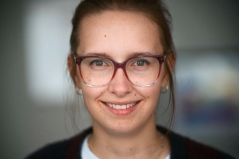Carina Giesen

Carina Giesen
Carina G. Giesen is Professor of Cognitive Psychology at the HMU Health and Medical University Erfurt in Erfurt, Germany. She studied psychology in Jena, Germany, and Glasgow, UK and received her PhD in Jena. Her research focuses on automatic action regulation. Stimulus-response binding and retrieval processes are therefore a core feature of her research, which she relates to learning phenomena, such as observational learning, contingency learning, and evaluative learning.
Carina G. Giesen

Carina G. Giesen
Carina G. Giesen is Professor of Cognitive Psychology at the HMU Health and Medical University Erfurt in Erfurt, Germany. She studied psychology in Jena, Germany, and Glasgow, UK and received her PhD in Jena. Her research focuses on automatic action regulation. Stimulus-response binding and retrieval processes are therefore a core feature of her research, which she relates to learning phenomena, such as observational learning, contingency learning, and evaluative learning.
Kathryn Bartlett Anderson

Kathryn Bartlett Anderson
Kathryn B. Anderson is a Social Psychologist and Professor at Our Lady of the Lake University in San Antonio, Texas. She has conducted research on the causes of aggression and violence for over 20 years. She is particularly interested in the "intersectionality" of current feminist and multicultural thought with research on aggression.
Odilia M. Laceulle

Odilia M. Laceulle
Dr. Odilia M. Laceulle is Associate Professor in the Department of Developmental Psychology at Utrecht University and a senior scientific researcher at Reinier van Arkel and GGzCentraal. Email: o.m.laceulle@uu.nl
Amy Muise

Amy Muise
Amy Muise earned her PhD in 2011 from the University of Guelph in Ontario, Canada. She is currently a postdoctoral fellow at the University of Toronto Mississauga, funded by a Social Science and Humanities Research Council Banting Fellowship.
Mara Hüttner

Mara Hüttner
Mara Hüttner is a tutor for Motivation and Emotion Psychology at the Technical University of Chemnitz, Department of General Psychology II. As an assistant researcher, she works at the Chair of Work Science and Innovation Management (Cluster "Competence Engineering"). She is currently pursuing a Master’s degree in clinical psychology and Psychotherapy.
Hsiao-Tien Tsai

Hsiao-Tien Tsai
Hsiao-Tien Tsai is a Master’s student in the Industrial and Organizational Psychology Program at New York University. She received a master’s degree in Social Psychology and a bachelor’s degree in Finance from National Taiwan University. She is interested in how people’s needs are met in business settings where the goal of maximizing benefits for both individuals and the organization is sought.
Sara Landström
Sara Landström
Sara Landström is an associate professor in psychology at the University of Gothenburg. Her research focuses on reliability and credibility assessments, victim blaming and legal decision making in child sexual abuse cases.
Katharine Coldiron

Katharine Coldiron
Katharine Coldiron's work has appeared in Ms., the Guardian, VIDA, the Rumpus, LARB, and elsewhere. She lives in California and at kcoldiron.com, and tweets @ferrifrigida.
Angela Dorrough

Angela Dorrough
Angela Dorrough is a research fellow at the University of Cologne. For several years she worked at the Max Planck Institute for Research on Collective Goods and in 2017 she obtained her doctorate in the interface between psychology and economics at the University of Göttingen. With collaborators from different countries she carried out multiple research projects towards intercultural cooperation and discrimination. Furthermore, she is committed to transparency and replicability in science.
